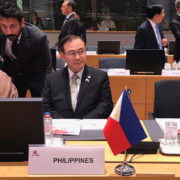Foreign Affairs Secretary Teodoro Locsin Jr. on Tuesday, July 16, said the Philippines will remain in the United Nations Human Rights Council (UNHRC) despite the Council’s approval of a resolution calling for an international review of the country’s war on illegal drugs.
“UNHRC vote is a small and harmless matter,” Locsin said on Twitter.
“We’re staying in UNHRC as a pedagogical duty to teach Europeans moral manners. We’re NOT severing diplomatic relations with any country. If we did, where’s the conversation? How do you insult those who insulted us if you cut them off?” he added.
Locsin on Sunday, July 14, floated the idea of the country’s withdrawal from the Council following the vote.
“No embassy in Iceland. Nor does Iceland have an embassy here. Iceland took the place of the U.S. after it withdrew from the Human Rights Council. I think we need to follow America more,” he said.
Left to our own devices
Senator Panfilo Lacson, for his part, cautioned the government against any plans to withdraw from the UNHRC.
“At the rate we are withdrawing from the UN bodies, it could only be a matter of time when we will be left to our own devices,” Lacson said Monday.
“We would not know when, what and how, but being a developing country, we may need to ask for help from the community of nations sooner or later,” he added.
Senate President Vicente Sotto III, on the other hand, expressed his support for the move.
He said the possible withdrawal of the Philippines from the UNHRC could benefit the body as it will be forced to review its rules, particularly on the voting on motions and resolutions.
“We will be saving the country P445 million a year if we detach ourselves from the UN,” the senate president added, referring to the Philippines’ $8.2 million mandatory contribution to the UN.
Up to Duterte
On Monday, July 15, Presidential spokesperson Salvador Panelo said the decision on whether or not the country would withdraw from the Council would be made by President Rodrigo Duterte.
“Final, final decision on this matter [will be up to him, because] he is the architect of the country’s foreign policy,” he told reporters, adding that the decision would be made based on the “best interest” of the Philippines.
Panelo also said the country should “take a serious look at our relationship with Iceland.”
According to him, there would be minimum consequences should the Philippines cut ties with the country.
“How will it affect us? What are our relations with Iceland in the first place? We do not even have an embassy there and them, here,” he said.
Sen. Francis Tolentino shared Panelo’s sentiment, saying everything depends on the president.
“Everything depends on the president as the chief architect of our diplomatic relations under the Constitution. Our standing and reputation as a sovereign state in the community of nations must be anchored on national interests and dignity,” Tolentino said.
The Philippines was elected to the UNHRC in October 2018. It will sit on the Council until 2021.
Not legally binding
According to Malacañang, the UNHRC resolution was not legally binding.
“How can that be legally binding? It is not,” Panelo said Monday, adding that it was up to the Philippine government if it would allow probers inside the country.
He also said it is up to the government if it would respond to the UN panel that would investigate the war on drugs.
“If we feel that the question is legitimate, we will respond,” he said.
“But if the question is only designed to fish information that it will use — by the inquiring country — to embarrass this government, certainly we will not oblige,” he added.
According to Panelo, the government has been transparent with everything happening on the drug war.
“We are not hiding anything, even before. What more can we show them? Like what we have said, everything that is happening in the anti-drug war is recorded. So, all they have to do is to ask us, not to prejudge us,” he said.





